Five of Swords Tarot Card Meaning
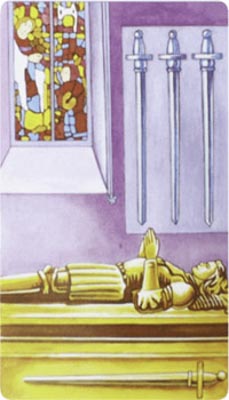
| Four of Swords |
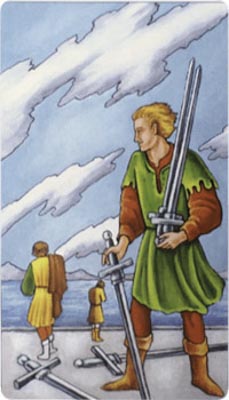
| Five of Swords |
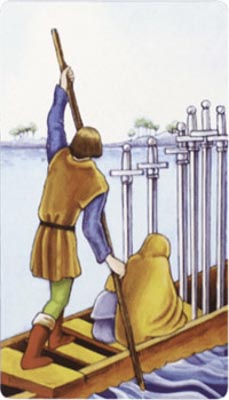
| Six of Swords |
General Meaning
The Five of Swords card is one of the more challenging cards in the Tarot deck. The sky is overcast, and no light breaks through. At this moment, you might anticipate troubles, losses both physical and emotional, dangerous situations, conflicts, legal battles, shattered plans, and other twists of Fate.
Card Motto
A lost battle doesn't mean defeat in the war.
 Tarot Arcana Interpretation
Tarot Arcana Interpretationby Marta Winter
Core Card Meanings Five of Swords

Description and Symbols of the Card Five of Swords
 This Tarot card depicts the final scene of a lost battle. A warrior from the opposing army smirks disdainfully, watching over his defeated opponents. They appear disheartened and defenseless—their swords lie scattered on the ground, seized by the victor who now triumphs and benefits from their misfortune. All that's left for the defeated is to humbly leave the battlefield.
This Tarot card depicts the final scene of a lost battle. A warrior from the opposing army smirks disdainfully, watching over his defeated opponents. They appear disheartened and defenseless—their swords lie scattered on the ground, seized by the victor who now triumphs and benefits from their misfortune. All that's left for the defeated is to humbly leave the battlefield.

Meaning in Upright Position
 When the Five of Swords appears in your Tarot reading, it's time to brace yourself with a "shield" of patience, willpower, and courage, and don't succumb to fear. This card indicates that circumstances might not be in your favor—expect to face a defeat and take some time to recover.
When the Five of Swords appears in your Tarot reading, it's time to brace yourself with a "shield" of patience, willpower, and courage, and don't succumb to fear. This card indicates that circumstances might not be in your favor—expect to face a defeat and take some time to recover.
It's hard to avoid trouble—you might be drawn into a conflict intentionally, forced to change plans, or even abandon them altogether. Prepare for losses, retreating, and licking your wounds while dreaming of revenge and restoring justice. However, if you've drawn the Five of Swords, it could mean that you took on more than you could handle and didn't manage your responsibilities well, now facing the consequences of overconfidence.
Despite the negativity the Five of Swords may suggest, it's too early to declare total defeat. It doesn't matter how many times you've fallen—what counts is how many times you get back up! Your willpower, resilience, flexibility, and sharp mind can help soften the blow and minimize losses. A new battle awaits where you can regain lost ground and steer the situation in a positive direction.
Keep the Five of Swords' prediction in mind, gather your strength and resolve, and hope for Fortuna's favor.
Key Meanings of the Upright Five of Swords
- Total defeat, losses, surrender, destruction, series of misfortunes, dismissal.
- Treachery, baseness, settling scores, weakness, revenge, stress.
- Quarrel, conflict, intrigues, confrontation, cruelty, aggression, insult, contempt.
- Theft, unfair division of property, damage, depletion.

Reversed Position
 When the Five of Swords appears reversed in a tarot spread, there's a glimmer of hope for victory, but with a twist: the triumph may be hollow and unsatisfying. Additionally, the Five of Swords warns that you might win only by resorting to dishonest means—bribery, manipulation, or outright deceit, which can be damaging to your karma.
When the Five of Swords appears reversed in a tarot spread, there's a glimmer of hope for victory, but with a twist: the triumph may be hollow and unsatisfying. Additionally, the Five of Swords warns that you might win only by resorting to dishonest means—bribery, manipulation, or outright deceit, which can be damaging to your karma.
The reversed Five of Swords hints at possible conflict either at work or within the family, potential fraud concerning your possessions, legal disputes, job loss, or divorce. The odds might not be in your favor, so prepare yourself for possible setbacks. However, if you remain adaptable and avoid showing all your cards while exploring alternative solutions, you might not achieve a full victory but could mitigate the damage significantly. And with patience and timing on your side, you may eventually turn the tables on those who've wronged you!
Key Meanings of the Reversed Five of Swords
- Dishonesty in dealings, deception, cunning, behind-the-scenes manipulation, enemies.
- Defeat and loss, but less severe than in its upright position.
- Low self-esteem, lack of spirit, indecision, delays.
- Conflict, selfishness, instigation, malicious attacks.

Meaning in Love Readings
 In matters of love, the upright Five of Swords card often signals the downfall of romantic plans and separation. This may stem from a relentless desire to win at any cost, to prove one's point, even if it means metaphorically "walking over others," disregarding all ethical norms.
In matters of love, the upright Five of Swords card often signals the downfall of romantic plans and separation. This may stem from a relentless desire to win at any cost, to prove one's point, even if it means metaphorically "walking over others," disregarding all ethical norms.
Two individuals who once loved or were fond of each other find themselves on opposing sides, with their relationship shattered beyond repair. Feelings are hurt, and the dominant emotions are pain, humiliation, and hostility towards the world. All that's left is to accept and endure this challenging period.
When reversed, the card also signifies grievances and parting ways, but the intensity of emotions is slightly less compared to its upright meaning.
In Readings About a Suitor or Loved One
When asking about a suitor or partner, the upright card suggests that your chosen one has a tragic history in love. They have faced significant heartbreak, perhaps even betrayal or infidelity.
A reversed card indicates that in love, your chosen one is determined to achieve their goals by any means necessary and is keen on winning. However, they may be more fascinated by the process itself rather than the outcome.

Reading for Money, Career
 In business readings, the Five of Swords card signifies conflicts with colleagues and partners, as well as failures and setbacks in your affairs. It seems there's an intense power struggle happening around you, and you are caught right in the middle of it.
In business readings, the Five of Swords card signifies conflicts with colleagues and partners, as well as failures and setbacks in your affairs. It seems there's an intense power struggle happening around you, and you are caught right in the middle of it.
Adversaries are prepared to go to great lengths, not hesitating to use unscrupulous and underhanded tactics. Rules are being broken, and those who oppose face harsh consequences—being squeezed out or even fired. Winning in such circumstances is impossible, leading to ruin, failed plans, and defeat.
When reversed, the card predicts a Pyrrhic victory achieved through deceit, leaving you unsatisfied despite the success.

Reading for a Person
 When drawing this card upright in a reading about a person, it suggests someone who, due to challenging circumstances, has lost their optimism and self-confidence. It may take some time for them to fully rebuild their self-esteem.
When drawing this card upright in a reading about a person, it suggests someone who, due to challenging circumstances, has lost their optimism and self-confidence. It may take some time for them to fully rebuild their self-esteem.
In the reversed position, this card represents a person with flexible moral principles, for whom concepts like "honesty" and "honor" are not constants. In pursuit of their interests, they might overlook those of others.

Reading for Advice
 Upright, the card advises you to accept a temporary defeat and retreat gracefully. Remember, trying to smash through a wall with your head can be more harmful to you than to the wall itself.
Upright, the card advises you to accept a temporary defeat and retreat gracefully. Remember, trying to smash through a wall with your head can be more harmful to you than to the wall itself.
Reversed in a spread, this card encourages you not to give up and to firmly stand your ground, even if it requires a lot of energy from you.

Reading for Outcome
 If the card appears upright, the outlook for your situation isn't very promising. You might face defeat in a certain matter.
If the card appears upright, the outlook for your situation isn't very promising. You might face defeat in a certain matter.
In a reversed position, the prediction for your situation is more ambiguous. You could achieve your goals, but only if you fight fiercely for your interests.
Meanings In Combination with All Tarot Cards

Major Arcana Combinations
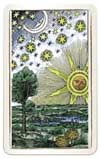 With 0 card The Fool – Losing a dispute, ending up sidelined, giving up.
With 0 card The Fool – Losing a dispute, ending up sidelined, giving up.
With 1 card The Magician — A force majeure, profiting at someone else's expense, unfair play, smugness.
With 2 card The High Priestess — A hopeless endeavor, self-sacrifice, responsibility.
In combination with 3 card The Empress — Losing a dispute, being deluded, losing authority.
With 4 card The Emperor — Change of leadership, a failed investment or endeavor, missing the flow.
With 5 card The Hierophant — Being humiliated, losing a dispute, making a serious mistake.
With 6 card The Lovers — Dissatisfaction, miscalculation, incorrect bet or false authority.
With 7 card The Chariot — An unsuccessful start, the real state of affairs, a hiccup in business.
With 8 card Strength — Persuading someone, breaking an opponent, not reaping expected benefits.
With 9 card The Hermit — Ridding of the past, confession or visiting a psychologist, gradual healing.
With 10 card Wheel of Fortune — Reconsideration of moral principles, freedom, being behind the scenes and watching.
With 11 card Justice — Harm to the cause, being wounded on duty, limitation of rights.
With 12 card The Hanged Man — Unfounded claims, being criticized from all sides, rebuke.
With 13 card Death — The matter won't progress, senseless waste of energy, financial loss.
With 14 card Temperance — Dissatisfaction with one's position, knowledge that cannot be applied, little action - much contemplation.
With 15 card The Devil — Losing trust, dropping authority, falling out with a loved one.
With 16 card The Tower — A setback, quarrel with friends or colleagues, disruption of business agreements.
With 17 card The Star — Ruining a good idea, poor realization, lack of planning, dispersal of a demonstration.
With 18 card The Moon — Split in the team, career change, failed business or impending bankruptcy.
With 19 card The Sun — Minor setbacks in a long journey, difficulties at home or at work or in an educational institution, everything comes with experience.
With 20 card Judgment — Major deception, letting down colleagues or relatives, suffering a defeat.
With 21 card The World — Genius not understood by others, the first pancake is always a mess, a test of strength.

Wands Suit Combinations
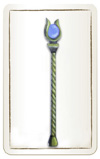 The Ace of Wands — Old disputes or disappointments, long-standing resentment, an inaccurate prediction, and failure.
The Ace of Wands — Old disputes or disappointments, long-standing resentment, an inaccurate prediction, and failure.
The Two of Wands — Upset plans, poor preparation, unverified information.
The Three of Wands — Loss or defeat, going back to the beginning, losing trust or influence.
The Four of Wands — Domestic discord, canceled plans, unconfirmed hopes, betrayal by loved ones.
The Five of Wands — Psychological pressure, recalling past failures, a painful blow to one's self-esteem.
The Six of Wands — Failures in business or personal matters, not living up to expectations, a poor start.
The Seven of Wands — Recognizing the enemy too late, losing the last support, standing alone with one's opinion.
The Eight of Wands — Dangerous dogmatism, falling into provocation, lack of progress.
The Nine of Wands — Betrayal, confirmation of a negative forecast, thoughts of defeat.
The Ten of Wands — Unnoticed efforts, being in a supporting role, not receiving deserved recognition.
The Page of Wands — Assessing losses or damage, failing an exam, making a mistake.
The Knight of Wands — Losing an argument or missing an opportunity, remaining on the sidelines.
The Queen of Wands — An annoying obstacle, suffering defeat, losing to competitors.
The King of Wands — Unfortunate circumstances due to haste leading to defeat, difficulties at work or loss of authority.

Swords Suit Combinations
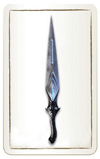 The Ace of Swords — Intentional defeat, portraying oneself as a victim of circumstances, subtle calculation of the situation.
The Ace of Swords — Intentional defeat, portraying oneself as a victim of circumstances, subtle calculation of the situation.
The Four of Swords — Isolation in anticipation of problems, a bad feeling, nervous tension, and an attempt to hide from something inevitable.
The Six of Swords — The ability to avoid danger, a talent for not being blamed, avoiding direct confrontation and staying in the shadows.
The Seven of Swords — Deceive and shift blame onto others, gain advantage from someone else's loss, work according to one's own scheme and remain unnoticed.
The Eight of Swords — Being a hostage to public opinion, surrendering under the weight of past failures, lacking faith in one's abilities.
The Nine of Swords — Expecting failure, lamenting a mistake, blaming oneself excessively or being too self-critical.
The Ten of Swords — Failure after failure, the influence of hexes or curses, the need for radical changes in life and mindset.
The Page of Swords — Quarrelsome nature, senseless criticism, inability to maintain a constructive conversation.
The Knight of Swords — Open conflict, breaking relationships completely, expressing everything that has been pent up inside, severing familiar ties.
The Queen of Swords — Pausing and calming down at the last moment, the danger of going too far, highly agitated nerves.
The King of Swords — Blaming others and trying to shift guilt or responsibility, a legal investigation for a fight or offense.

Five of Swords and Swords Suit Combinations
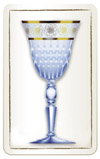 The Ace of Cups — A harsh lesson of betrayal, the school of life, the realization of defeat.
The Ace of Cups — A harsh lesson of betrayal, the school of life, the realization of defeat.
The Two of Cups — Confronting selfishness, broken agreements, falling victim to trustful deception.
The Three of Cups — Receiving an important lesson, facing justified criticism, the fulfillment of a negative forecast.
The Four of Cups — Burdened by someone else's secret, knowing and concealing the truth, covering up another's wrongdoing.
The Five of Cups — Evaluating the situation that has developed, experiencing loss, enduring failure and loneliness.
The Six of Cups — Unsuccessful experiment, disapproval and reproach from others, a project that didn't work out.
The Seven of Cups — Misalignment of desires with possibilities, lack of leadership qualities, mistrust from colleagues or friends.
The Eight of Cups — Digesting negative experiences, letting someone down, a questionable venture that will not bring benefits or a good reputation.
The Nine of Cups — Losing persuasiveness, an unforeseen defeat, a bad reputation.
The Ten of Cups — Disappointing loved ones, bringing shame upon oneself, not living up to expectations.
The Page of Cups — Accepting defeat, recognizing one's own mistakes and misjudgments, foreseeing failure.
The Knight of Cups — Losing to a more knowledgeable opponent, lacking qualifications, plans not aligning with the real state of affairs.
The Queen of Cups — Sensing unpreparedness for a clash, anticipating failure in advance, doubting one's own ideals.
The King of Cups — Initiating a domestic scandal or a workplace dispute, losing to a competitor or adversary, realizing that one is not as clever as desired.

Pentacles Suit Combinations
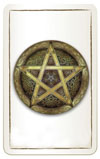 The Ace of Pentacles — Losing a property dispute, ending up with nothing, getting less than deserved.
The Ace of Pentacles — Losing a property dispute, ending up with nothing, getting less than deserved.
The Two of Pentacles — Immoral behavior, remembering debts, trying to forget one's problems, feeling low, venting to a friend.
The Three of Pentacles — Increased competition, issues in the workplace or betrayal by colleagues, a decrease in the number of clients.
The Four of Pentacles — Concerns about security, attempts at revenge or fraud, a dangerous situation.
The Five of Pentacles — Losing a lawsuit, property confiscation, wasting time and energy on a futile struggle.
The Six of Pentacles — Alimony, fines, or penalties, spending money recklessly or getting into large debts.
The Seven of Pentacles — Settling conflicts after defeat, a period of calm and reevaluation, harboring grudges for a long time.
The Eight of Pentacles — Attempting to take over a business, someone trying to undermine or frame you, the danger of losing a lucrative position.
The Nine of Pentacles — Unfavorable attention to a profitable project, one's own venture not working out, being surpassed by a business competitor or rival.
The Ten of Pentacles — Internal conflicts or family disagreements, rivalry with colleagues, losing to someone's authority.
The Page of Pentacles — Trying to prove the viability of one's own idea, attempting to gain trust, a chance to meet a good partner.
The Knight of Pentacles — Abandoning a futile endeavor, leaving a pointless project, finding one's own path to prosperity.
The Queen of Pentacles — Missing a chance for love, pursuing a woman for her money, a bored and wealthy woman.
The King of Pentacles — Trying to attract the attention of a wealthy suitor, being dependent on others' approval, being impressionable.
Example Interpretation In a Daily Spread

A Card Has Fallen for You Five of Swords? This Signifies:
Today is a challenging day that may bring confrontations and setbacks. You'll encounter conflicts, opposition, and the need to defend your righteousness and protect your interests. Regardless of your efforts and the validity of your position, the situation may not unfold in your favor. The card of the day advises you to prepare for a struggle: if you maintain your resilience today, you'll have the opportunity to rectify things later on.



















































































































